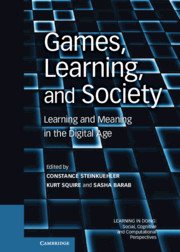Book contents
- Frontmatter
- Contents
- Contributors
- Series Foreword
- Foreword
- Acknowledgments
- Section I Games as Designed Experience
- 1 Introduction to Section I
- 2 Designed Cultures
- 3 Theme Is Not Meaning
- 4 Our Cheatin’ Hearts
- 5 Playing the Odds
- 6 Nurturing Lateral Leaps in Game Design
- 7 Uncharted 2: Among Thieves – How to Become a Hero
- 8 Interview with Harmonix
- 9 Yomi
- Section II Games as Emergent Culture
- Section III Games as Twenty-First-Century Curriculum
- Index
8 - Interview with Harmonix
Published online by Cambridge University Press: 05 August 2012
- Frontmatter
- Contents
- Contributors
- Series Foreword
- Foreword
- Acknowledgments
- Section I Games as Designed Experience
- 1 Introduction to Section I
- 2 Designed Cultures
- 3 Theme Is Not Meaning
- 4 Our Cheatin’ Hearts
- 5 Playing the Odds
- 6 Nurturing Lateral Leaps in Game Design
- 7 Uncharted 2: Among Thieves – How to Become a Hero
- 8 Interview with Harmonix
- 9 Yomi
- Section II Games as Emergent Culture
- Section III Games as Twenty-First-Century Curriculum
- Index
Summary
The following interview between Kurt Squire and Greg LoPiccolo of Harmonix Games (on June 22, 2010) tries to get at how Harmonix thinks about designing games to elicit particularly musical experiences. Harmonix, developers of FreQuency, Amplitude, Karaoke Revolution, Guitar Hero I and II, and now the Rock Band series, is known for its pioneering work in rhythm action games, taking them from a niche genre to broad mainstream success. Sarah Chu, who transcribed and cleaned up the transcripts, contributed interview questions as well.
Kurt Squire: Can you talk a little bit about the game design philosophy at Harmonix and a little about how you think about game design?
Greg LoPiccolo: Well, the company charter from day one was to use technology to provide nonmusicians with the tremendous experience of creating music. Most of the people here are musicians or frustrated musicians or some version of that. There’s a strong consensus here that if you have proi ciency in an instrument, performing music is one of the great joys in life. It is enormously fun and rewarding, but this experience is denied to most people because the learning curve is so steep. It really requires multiple years of focus, dedication, and time to get good enough on a traditional instrument to really express yourself. So, broadly conceived, the ambition here has always been to try to use technology to bring more people into that experience. Harmonix was not originally games-specii c. It wasn’t until maybe about four or five years ago that we realized that games are an appropriate platform to bring this vision to life.
- Type
- Chapter
- Information
- Games, Learning, and SocietyLearning and Meaning in the Digital Age, pp. 108 - 115Publisher: Cambridge University PressPrint publication year: 2012

